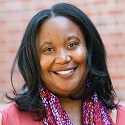| GRADES K-12 |
| Don’t Let Bacteria Be the Only Culture You Have
Jessica Parker, Science Teacher, Cabarrus County Schools
This session will assess teachers’ comfort levels with global perspectives and cultural components of science topics. From there, the instructor will facilitate a conversation to share experiences and conclude with classroom examples of global/cultural integration in all science disciplines. The session will be collaborative in nature and is meant to start a conversation for how to teach values, skills, language and respect for diversity in what is traditionally a quantitative and right/wrong discipline of study. Ideas for science lessons at all levels will be welcomed and shared!
|
| Engaging Students With Service Learning
Kate Highsmith, Global Inquiry and Design Teacher, Cabarrus County Schools
Andy Highsmith, Instructional Technology Facilitator, Cabarrus County Schools
This session will focus on how we can help craft our students’ world view through the lens of service learning. In the process, we will discover that service learning attaches a purpose to the tasks that students are asked to do, and generates a high level of student engagement. This session will also discuss how we can coordinate service learning projects across subject areas in schools so that we include standards from all academic areas.
|
| The Impact of Our Work in Our Community
Alejandro Luna Cadena, Spanish Teacher, Cabarrus County Schools
The class of Spanish for Native Speakers was invited to start a mentorship program with a neighbor middle school. This project has provided a support system for all students involved. In this session, the presenter will encourage teachers to identify which elements of their curriculum can contribute to actual needs of our community. Teachers will be invited to think of themselves as elements of change and progress for our county. They will also gain an awareness of the amount of Hispanic students and Hispanic culture in our district.
|
| Drum Circle
Bart Tulbert, Fine Arts Coordinator, Cabarrus County Schools
This session will teach educators about the evolution of music through the use of world drums while teaching them basic rhythms and melodies for performance.
|
| Supporting Immigrant Students in a Politically Charged World
Teresa Webster Palma, Program Coordinator Title III/ESL, Cabarrus County Schools
Stacey Diaz, ESL School Counselor, Cabarrus County Schools
This session will teach strategies to support immigrant students and their families. The presenters will share data, what has worked and the challenges faced to support the 82 languages of the diverse English Learner student population in Cabarrus County Schools. They will also cover cultural pedagogy, immigration law and policy and the challenges of becoming a US citizen. Are you confused about the difference between asylum and refugee? Do you know the visa options for stakeholders? Attendees will leave with a strengthened understanding of the immense challenges immigrant students face with cultural assimilation during these politically charged times. Resources will be provided including a guideline to create a strategic plan to support immigrant students and stakeholders.
|
| Going Glocal: Service Learning as a Whole School Initiative
Leanne Havely, Curriculum and Instruction/STEM Coordinator, Cabarrus County Schools
Participants will develop an understanding of service learning and “glocalization.” Participants will explore a service learning project completed at CHS and begin to develop a plan for initiating a service learning project in their school.
|
| Global Connections through Art and Culture
Jennifer Nichols, Spanish Teacher, Cabarrus County Schools
Danielle Gaimari, Art Teacher, Cabarrus County Schools
Join this session to learn about global resources and cross-curricular art and cultural activities, like teaching culture through mandalas, Day of the Dead and Alebrijes. The session will also explore the Global Digital Educator Badge process and more. Teachers will have access to adaptable culture and art activities and ideas for cross-curricular collaborations (art, language, history, math, science, dance, music, drafting, etc.).
|
| Using Google Tour Creater to Create 360° Experiences Using Both Cell Phones and Computers
Michael Petersen, Instructional Technology Facilitator, Cabarrus County Schools
Lance Pfeifer, Instructional Technology Facilitator, Cabarrus County Schools
Immerse your students in real world geography by using Google’s tools. Students can virtually explore famous battlegrounds, world monuments, national parks or make a text come to life by using Google Cardboard and customized expeditions. Come to this hands on session to learn how to go beyond the walls of your classroom. It is great for all content areas.
|
| Celebrating and Supporting Multilingualism in Our Schools
Marina Hernandez, Dual Language Spanish Teacher, Cabarrus County Schools
This session will explore the benefits of multilingualism, review some useful terminology and explore various second language acquisition theories. The presenter will explore the nuances around the term “language”; many times teachers think it refers only to foreign languages, but actually, language is the instrument we use to communicate with others and interact, think and relate to other people and our environment. Participants will explore the policies and protocols in international schools and talk about the language teacher classroom.
|
| Using Picture Books to Nurture a Global Mindset
Astrid Emily Francis, High School ESL Teacher, Cabarrus County Schools
Picture books are powerful pathways to learn, understand and embrace the world around us. We’ll learn how characters’ experiences found in picture books can serve as mirrors that reflect and reaffirm students’ culture and experiences. We’ll also learn how picture books serve as windows to an unknown world that nurtures empathy and passion for a global mindset. Through a modeled lesson and examples, participants will learn how to analyze and incorporate picture books in lessons that support reading, writing, listening and academic discourse. We’ll be creating our own book using WriteReader app as a platform to share our own stories and reflections after reading diverse picture books.
|
| Celebrating Student Culture Through Song
Sloane Wood, K-5 Music Teacher, Cabarrus County Schools
Participants will have access to songs they can use for their students. Participants will learn about resources teaching cultural sensitivity and responsiveness to the variety of cultures represented in their student population. Finally, participants will learn about the pedagogical process for teaching a song in a foreign language.
|
| Beyond Mexico: Teaching About Latin America and the Caribbean
Corin Zaragoza Estrera, Outreach Coordinator, CLACS, UNC-Chapel Hill
Sixty percent of North Carolina Latinos are of Mexican origin. For this reason, it is undeniably important to teach about Mexico in the classroom. But how can educators teach about the countries of origin of the other forty percent of NC Latinos? This session will provide information, lessons and resources for educators to teach about other Latin American and Caribbean counties with connections to NC.
|
| Teaching about the Middle East through the Arts
Emma Harver, Outreach Coordinator, Duke-UNC Consortium for Middle East Studies, UNC-Chapel Hill
Art helps us grow and evolve in our understanding of ourselves, each other and the world we live in. This interactive session will enhance understanding of the Middle East through a cultural arts perspective, explore how the arts can increase global competence and include lessons and resources for teaching about the Middle East in the K-12 classroom.
|
| Asian Immigration Trends to the US and the World
Shuyi Lin, Program Associate, Carolina Asia Center, UNC-Chapel Hill
This session will focus on recent trends in Asian immigration to North Carolina and the US as well as immigrant communities and diaspora in the world. The speaker will include her personal history. The unit encourages students to research and develop a better understanding of migration and immigrant communities using online sources (i.e. data from the Migration Policy Institute).
|
| GRADES K-5 |
| What Matters to Me?
Mary Hooks, IB PYP Coordinator, Cabarrus County Schools
J.T. Eberhardt, Fifth Grade Teacher, Cabarrus County Schools
This session is an inquiry into the exit project for the IB Primary Years Programme called the Exhibition. Develop learner agency through voice, choice and ownership through an open-ended mini-inquiry of the Sustainable Development Goals. Learn how fifth grade students designed their own Non-Government Organizations, developed plans for taking action to address local and global issues and used multimedia to share with the school community. The research process and student examples will be also shared.
|
| Real World Applications – Understanding Cultural Diversity and Children’s Wellbeing
Martella Hawkins, Guidance Counselor, Cabarrus County Schools
Jacobia Williams, School Social Worker, Cabarrus County Schools
Our cultural experiences and values shape the ways we see ourselves and what we think is important. Cultural perspectives influence how we parent, how we understand children and how we educate them. This session looks at influences related to cultural diversity that may affect the social and emotional development and wellbeing of children from cultural and linguistically diverse backgrounds. This session will help educators see that our world is diverse and beautiful, and educators can teach about its different ways by learning the importance of cultural diversity, the effects of trauma, barriers to communication and more.
|
| Making Geography Relevant AND Interesting, One Continent at a Time
Catherine Foxworth, Third Grade Teacher, Cabarrus County Schools
When integrating reading and social studies units on cultural diversity, economics and geography, students focus on several countries within a continent. By engaging in activities where they compare and study different types of maps, students can glean a world of information about a country’s population, languages spoken, landforms, goods and services produced, etc., from sources that are appropriate and non-threatening. The directions that a teacher can take this information are diverse: reading and writing responses, connections to the environment, biological diversity, specific cultural studies, folktales and/or local storytelling styles – even mathematical exercises that incorporate numerical data. Teachers can easily make data and information obtained from their map studies as integrated and adaptive as their curriculum – and imagination – allows!
|
| GRADES K-8 |
| Solving Real World Problems: An Expedition to Bangladesh
Lara Cabaniss, STEM Coach, Cabarrus County Schools
Carmen Money, Instructional Technology Facilitator
This session will integrate elements of STEM, problem-based learning, engineering, technology and global awareness. Participants will travel to Bangladesh on an interdisciplinary adventure with a mission to solve a global problem facing this country. Using tools such as Tour Builder, Google Expeditions and the engineering design cycle, participants will be challenged to solve a global problem while mastering core standards. |
| GRADES 6-8 |
| Global Mathematics
Amber Zimmer, Mathematics Teacher, Cabarrus County Schools
Mathematics? Global? Do those two words really belong in the same title? Yes! Mathematics helps explain our world. Global inequality and inequalities can be tied together to study rates and populations and compare them, analyze them and understand commonalities and differences among them. Not only can global instruction be easily incorporated into mathematics, but mathematics is a global function of understanding our world.
|
| GRADES 6-12 |
| The Art of Integrating Global Experiences
Shanna Meehan, IB Coordinator, Cabarrus County Schools
Meredith Farrell, Art Teacher, School Administration Intern
Integrating global experiences in classroom practices enriches our students’ capacity to be reflective global citizens and create a positive impact on the world. This session will provide a two-part opportunity for educators to learn about the benefit of global awareness in art classrooms and how authentic global experiences have shaped whole-school service learning and international mindedness.
|
| Reading Responsibly: Incorporating Human Rights in the Classroom
Katherine Clymer, School Library Media Coordinator, Cabarrus County Schools
Tarah Helms, Eighth Grade Language and Literature Teacher, Cabarrus County Schools
This session will explore how to incorporate fiction and nonfiction texts in the classroom that focus on human rights issues on a global scale. By reading and understanding these global issues, students will gain an enhanced perspective on these issues. Students will learn how to read and think critically about human rights, looking specifically at the United Nations Rights of the Child. Students will use their new perspective as a catalyst for change by analyzing possible solutions for these global issues.
|
| GRADES 9-12 |
| Empathy and Action: Empowering Students to Be Real World Problem Solvers
Julie Loukos, English Teacher, Cabarrus County Schools
After teaching a unit on human rights issues, I became aware of how little students knew – and in some instances, cared – about human rights issues around the world. The general perception was often, “Well, I can’t do anything about it, so why should I care?” The need for empathy in education is so strongly highlighted, but how do we teach that? The answer lies in empowering students to be solution creators. This session will showcase lessons that provide opportunities for students to critically think about human rights issues, develop empathy for those involved and inspire them to propose solutions for the problems. It will provide hope and tangible activities for educators in guiding students to being more empathetic problem solvers in the real world.
|
| International Exchange Programs
Bethany Gregory, STEM Coach, Cabarrus County Schools
Jennifer Caligan, STEM Coach, Cabarrus County Schools
In this session, teachers will learn about the current Danish Exchange program through Central Cabarrus High School and the amazing avenues and opportunities this opened for students and staff. In addition, teachers will learn of the benefits of high school exchange programs through both the student and teacher perspective, along with the logistics on how to run an exchange program through Cabarrus County Schools.
|
| Theory of Knowledge Presentation Framework
Andrew Rowe, IB Teacher, Cabarrus County Schools
Marie Deal, IB Coordinator, Cabarrus County Schools
The presenters will explore how the International Baccalaureate Program’s curriculum teaches students to view knowledge through ways of knowing, areas of knowledge and real life situations. We will deliver a lesson asking the audience to bring in current global issues, summarize in the TOK presentation framework, create series of knowledge questions and make connections across at least two other areas of knowledge. The audience will be asked to share their TOK presentation with whole group.
|
| K-12 ADMINISTRATORS |
| World Language School: Bridging Communities through Shared Language
Chasity Dolan, Cabarrus County Schools
Human connection is the driving force in student success. The connection between a teacher and their student and the connection between a teacher and their students’ parents are all bridged by common language. In this session you will learn how one travel abroad experience inspired an innovative approach to sharing and promoting language throughout a school and into the community.
|





